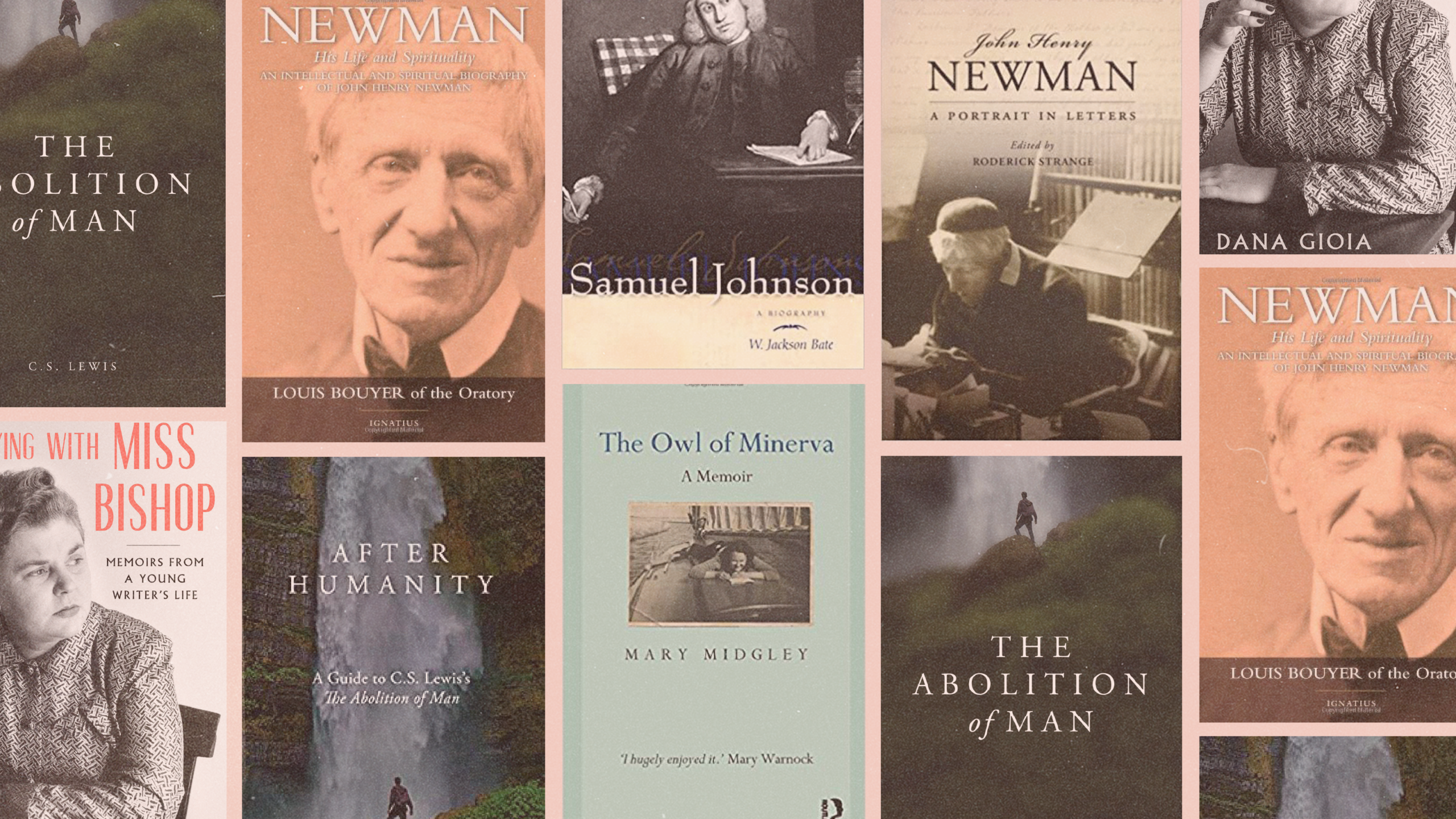As I write this, it’s cold and snowing—definitely the right weather to curl up indoors with a good book, or two, or three. The new year is also a good time to look back on what I’ve read over the last twelve months and find some stand-outs to share with my readers.
There are so many books that I could recommend that it’s hard to choose! I’ve decided to focus on ones that require a bit more time to read—usually because of length or complexity—but that are well worth making that investment.
Without further ado, here are seven non-fiction books I read in 2021 that I think are well worth sustained attention in 2022.
After Humanity: A Guide to C.S. Lewis’s The Abolition of Man by Michael Ward and The Abolition of Man, by C.S. Lewis
C.S. Lewis’s The Abolition of Man is the most prophetic of all his books and quite possibly the most relevant today. Is there such a thing as objective value, or are our claims of “right” and “wrong” nothing more than personal opinion? Lewis makes a philosophical case for the reality of objective value, and along the way, he offers keen insight into what it means to be human—and a warning as to how we might be on a path to destroy our own humanity.
Abolition, though a short book, is a challenging and difficult book, as I know from having taught it to undergraduate and graduate students over the years; and as Ward is my friend and colleague, I’d had the benefit of (with his permission) using some extracts from the draft of After Humanity in my teaching of Abolition. I saw firsthand how much light it shed on Lewis’s extremely important book. I was thus very pleased indeed when After Humanity was published by Word on Fire Academic last summer. Ward provides abundant context for Abolition, and an in-depth, at times line-by-line gloss on Lewis’s densely written and highly allusive text—and it’s a beautifully written pleasure to read. (Also, there is a photo gallery!) So if there is one book that you are going to read this year to engage with the philosophical underpinnings of our modern culture and its difficulties, make it a combination: Abolition of Man and After Humanity.
Samuel Johnson: A Biography by John Wain
One of the authors who most influenced C.S. Lewis was Samuel Johnson, the author of the massive and ground-breaking Dictionary, as well as an essayist, biographer, and literary critic. This biography of Johnson was, as it happens, written by one of the lesser-known Inklings, John Wain, and is unjustly out of print; it’s worth tracking down a used copy. Dr. Johnson was a remarkable man, and Wain’s biography does a fantastic job in capturing his life and character. You may well find yourself, as I did, wanting to read or re-read Boswell’s Life of Johnson or Johnson’s essays!
Studying with Miss Bishop: Memoirs from a Young Writer’s Life by Dana Gioia
Shifting from the eighteenth century to the twentieth, in this book, the Catholic poet Dana Gioia takes readers on a gentle and thoughtful tour of his own development as a writer. The title refers to the poet Elizabeth Bishop, one of six people (some famous, some not) who had a significant effect on Gioia as a young writer. It’s a pleasure to read simply for the deftly drawn portraits of the figures here, but it’s also useful, I think, in that it shows the unexpected, not-necessarily-straightforward ways in which a writer grows and develops. This is a relatively quick read and is structurally well suited for reading in sections in between other, longer titles. It may well lead you to reading Gioia’s poetry and his essay The Catholic Writer Today.
The Owl of Minerva: A Memoir by Mary Midgley
Mary Midgely, who died in 2018 at the age of 99, was one of the foremost moral philosophers in the United Kingdom and a remarkable woman. Not herself a theist, she was not hostile to Christianity and entirely rejected scientism and reductionistic philosophical views. Her memoir The Owl of Minerva is a pleasure to read and in no way requires background knowledge of her philosophical work; it is a fascinating account of her childhood, her time studying at Oxford, and her efforts to balance work with raising three children, all written with insight and wit. Midgley’s personality comes through clearly in her memoir, and I was glad to “get to know her” in the reading of this book.
Newman: His Life and Spirituality by Louis Bouyer and John Henry Newman: A Portrait in Letters, edited by Roderick Strange
In the last year, I’ve read several biographies of St. John Henry Newman; this one by Fr. Louis Bouyer of the Oratory rises to the top for the general reader. As the subtitle suggests, it presents not just the bare facts of Newman’s life, but a thoughtful reading of his spirituality. Without getting bogged down in the complex details of Newman’s life and work, Bouyer gives an engaging, three-dimensional portrait of a great man.
Newman was also one of the great letter writers of his day. Roderick Strange’s selection takes us through Newman’s life with letters that he wrote to family, friends, and colleagues. Each letter is presented in full (something that I very much appreciate!), and there are helpful explanatory notes as well. I found this volume to be quite moving, and it provided excellent support while reading his biography. Since we now know that Newman is a saint, it is heartening to encounter him as a complex, full, real person who also suffered difficulties and disappointments in his long life. Here is no plaster saint, but a real human being.
Happy reading!
